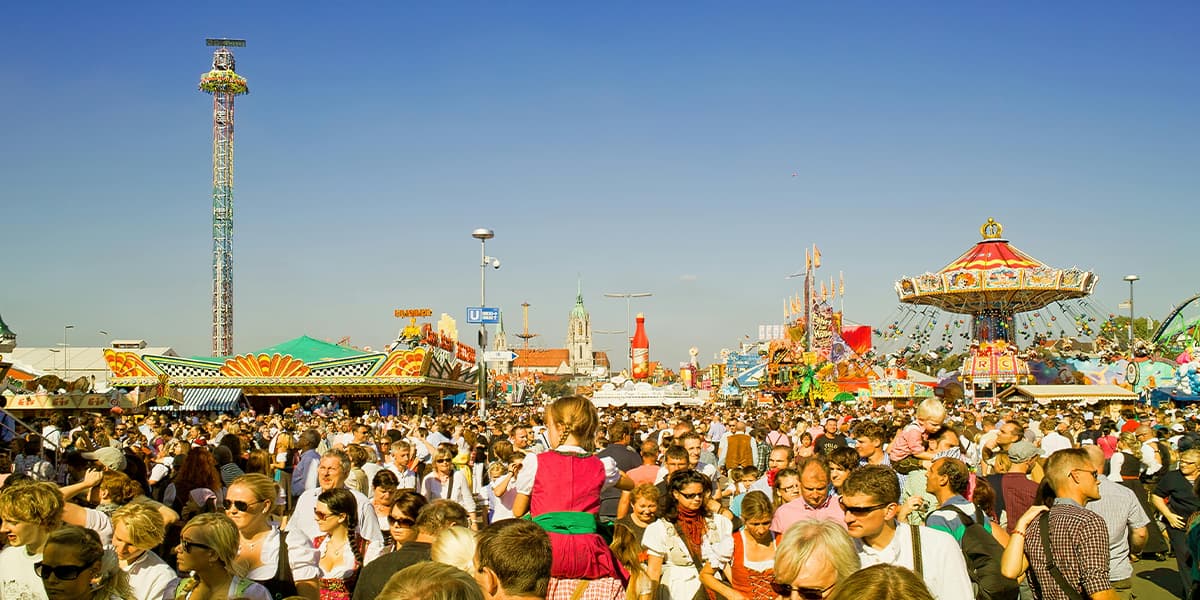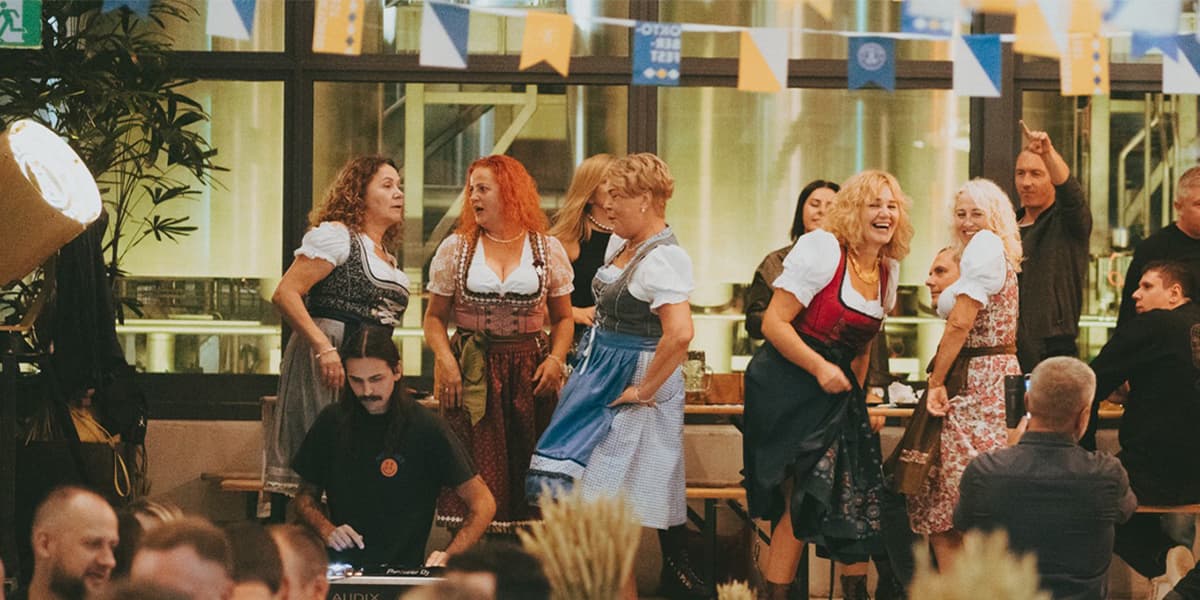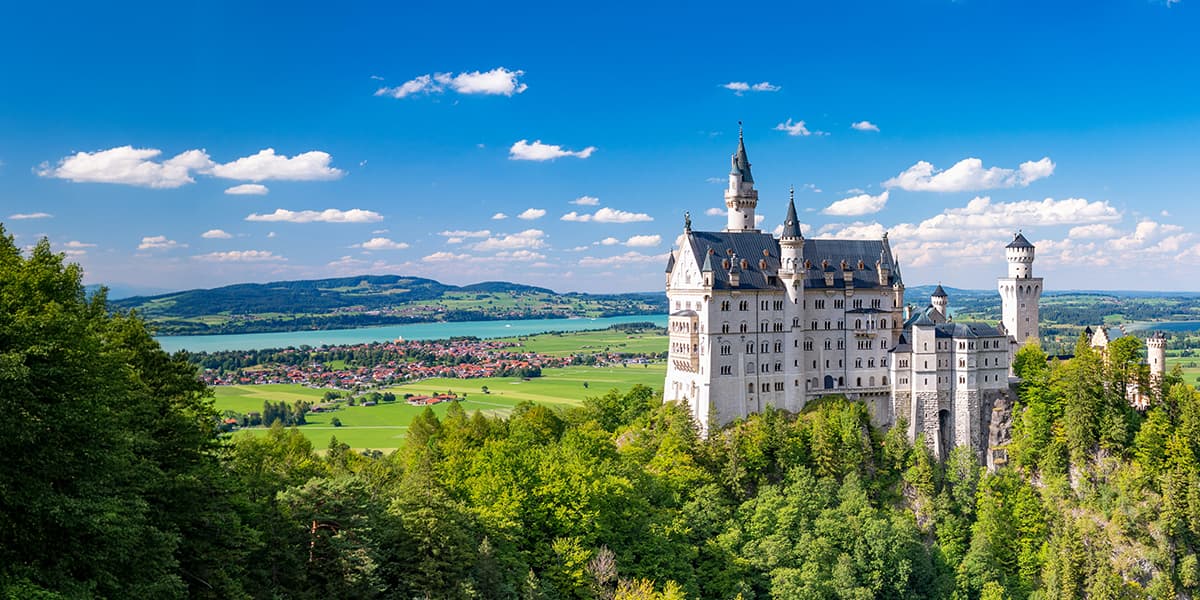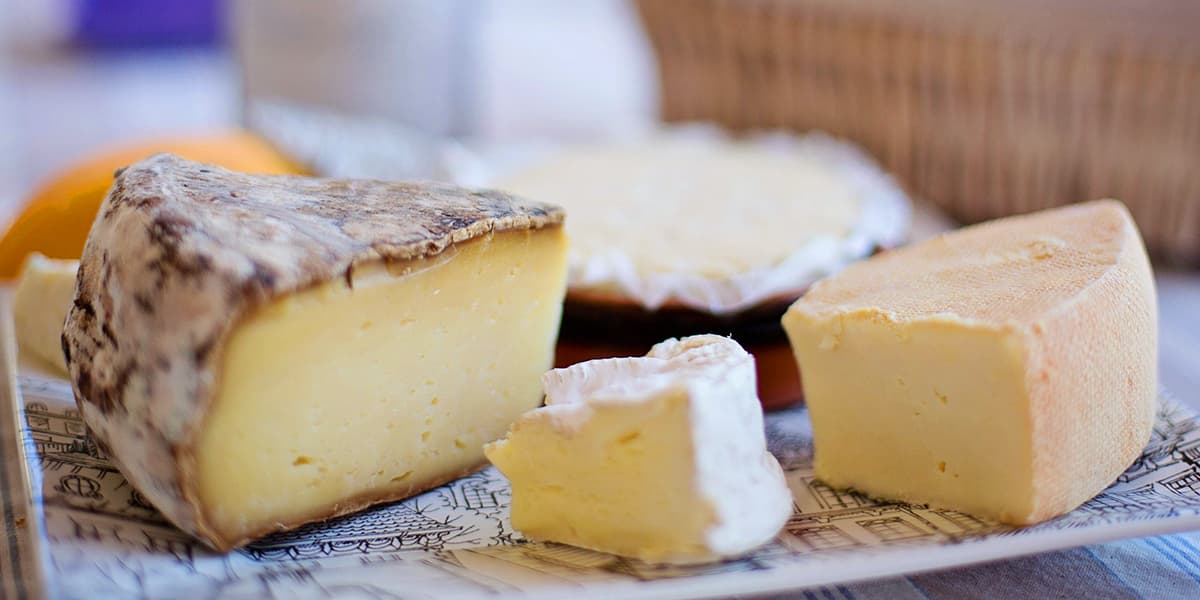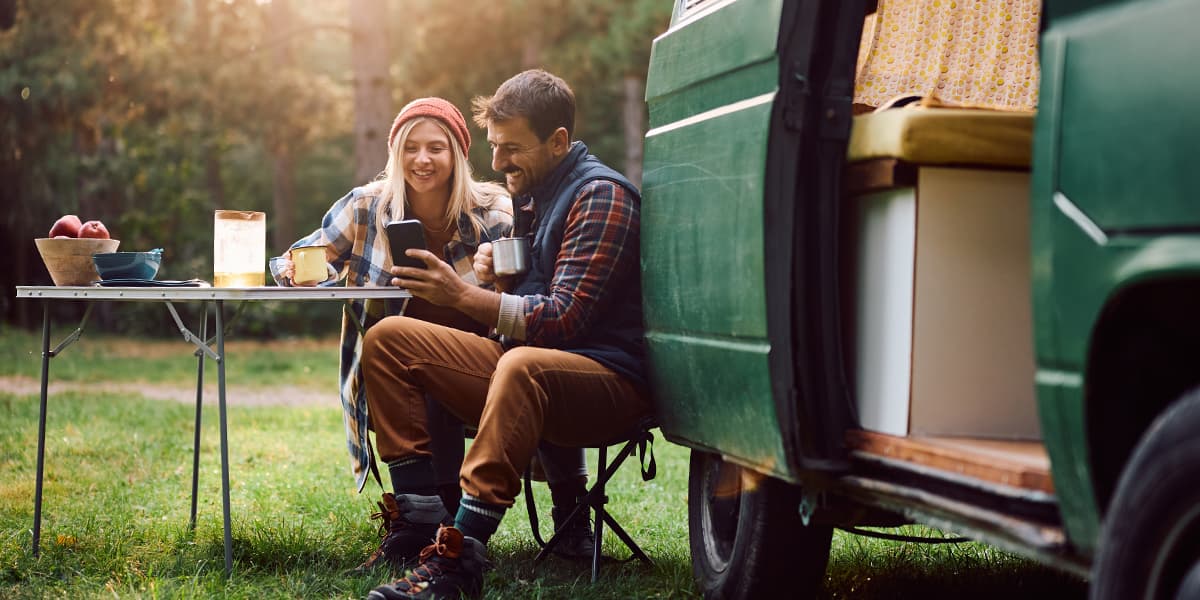One of the most iconic European festivals in the world, Oktoberfest is an exciting celebration that draws millions of visitors to Germany every year. The bustling beer tents filled with traditional Bavarian music, the aroma of freshly baked pretzels, and crowds of people dressed in authentic tracht will immerse you in Bavarian culture.
Whether you’re visiting to soak in the festive atmosphere or sample Bavaria’s renowned beers, a trip to Oktoberfest is sure to be one you won’t forget. Read on to learn everything you need to know before your visit.
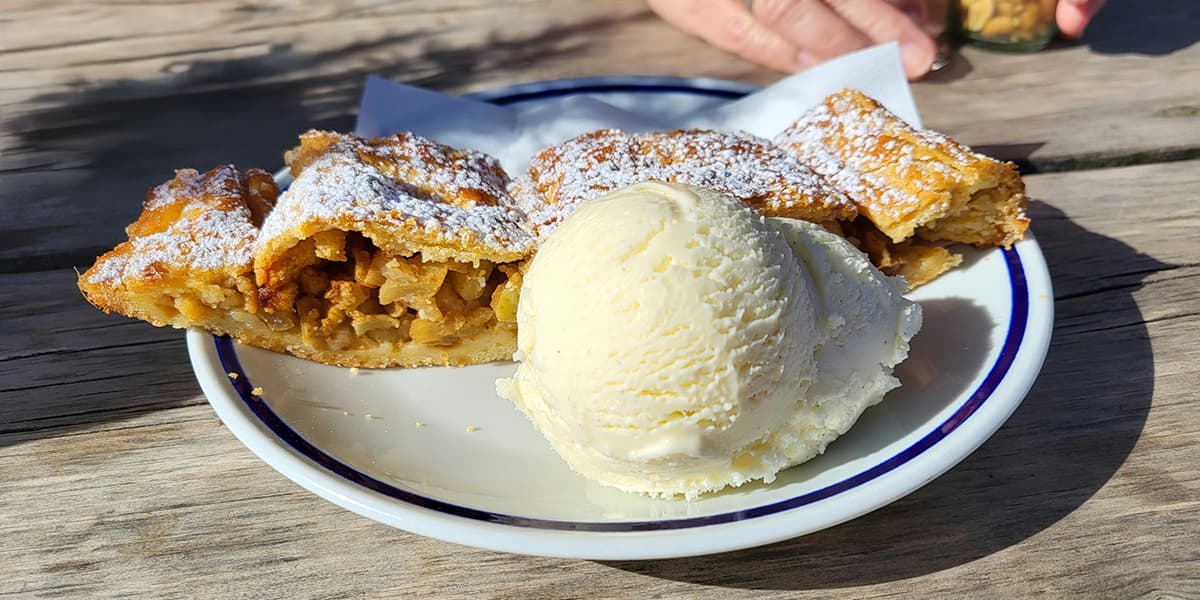
What is Oktoberfest?
Oktoberfest is an annual festival held in Munich, Germany. It’s the world’s largest celebration of Bavarian culture, offering an impressive combination of exceptional beer, hearty traditional food, and thousands of people dressed in authentic German clothing.
Where is Oktoberfest held?
Oktoberfest is held in Munich each year, in the southeastern state of Bavaria. Millions of visitors travel to the city to enjoy 2 weeks of festivities just outside the centre.
When Does Oktoberfest Start?
Oktoberfest operates on a schedule based on specific days rather than fixed dates, meaning the timing varies from year to year. The festival typically starts in late September and concludes on the first Sunday in October. In 2025, the festival will take place from Saturday 20th September to Sunday 5th October.
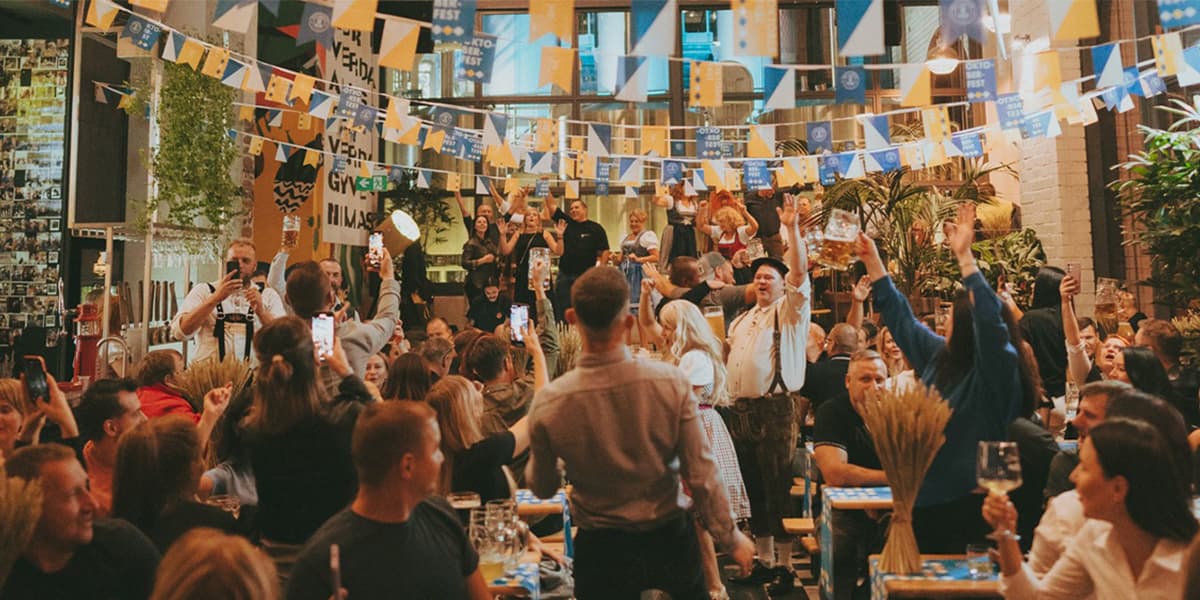
What is the History Behind Oktoberfest?
Oktoberfest originated in 1810, following a royal wedding celebration for Crown Prince Ludwig of Bavaria and Princess Therese of Saxe-Hildburghausen. The festivities included an elaborate horse race in a field, which, at the time, was located on the outskirts of Munich. Following the celebrations, the field was named Theresienwiese (Therese’s meadow) in honour of the bride.
The festivities were so popular that the royal couple decided to continue the traditions every year. Over time, this wedding party has evolved into today’s festival, complete with lively beer halls, fairground rides, traditional music performances and authentic Bavarian cuisine.
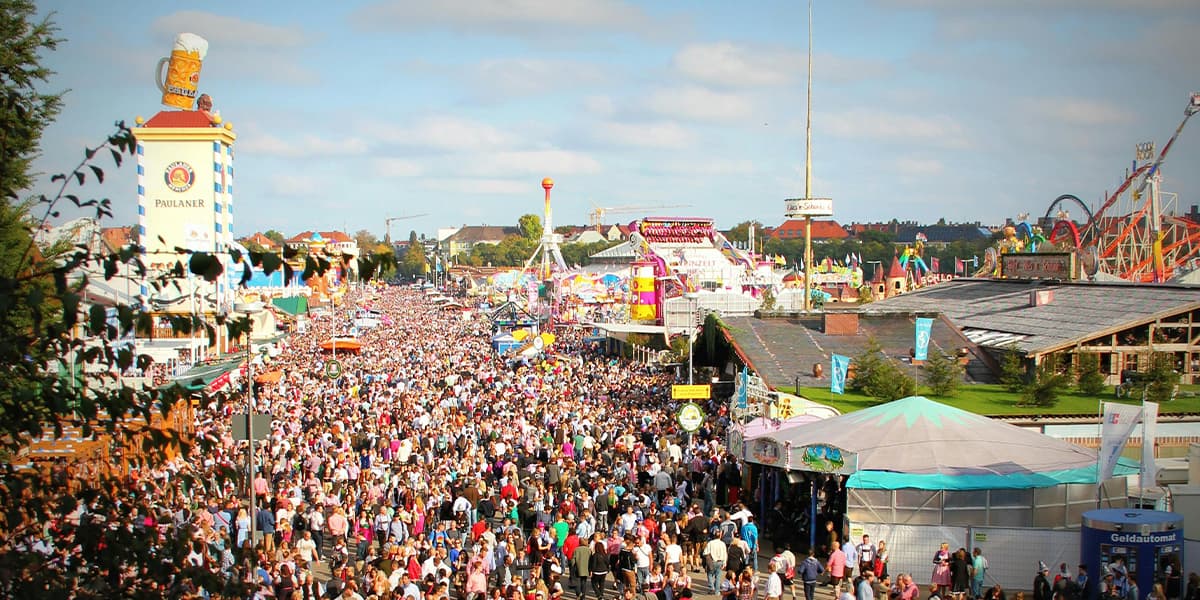
What to wear to Oktoberfest?
The traditional clothing worn during Oktoberfest is a huge part of the celebrations, adding authenticity to the experience. You aren’t required to wear specific Oktoberfest outfits, but most people dress for the occasion! Women wear dirndls, a traditional Bavarian dress that was historically worn to everything from formal events to festivals. The dress features a close-fitting bodice, a blouse worn underneath with a full skirt and decorative apron. Men sport lederhosen, short knee-length breeches made of leather. This is often paired with a traditional white or checkered shirt, knee-high wool socks, and sturdy shoes.
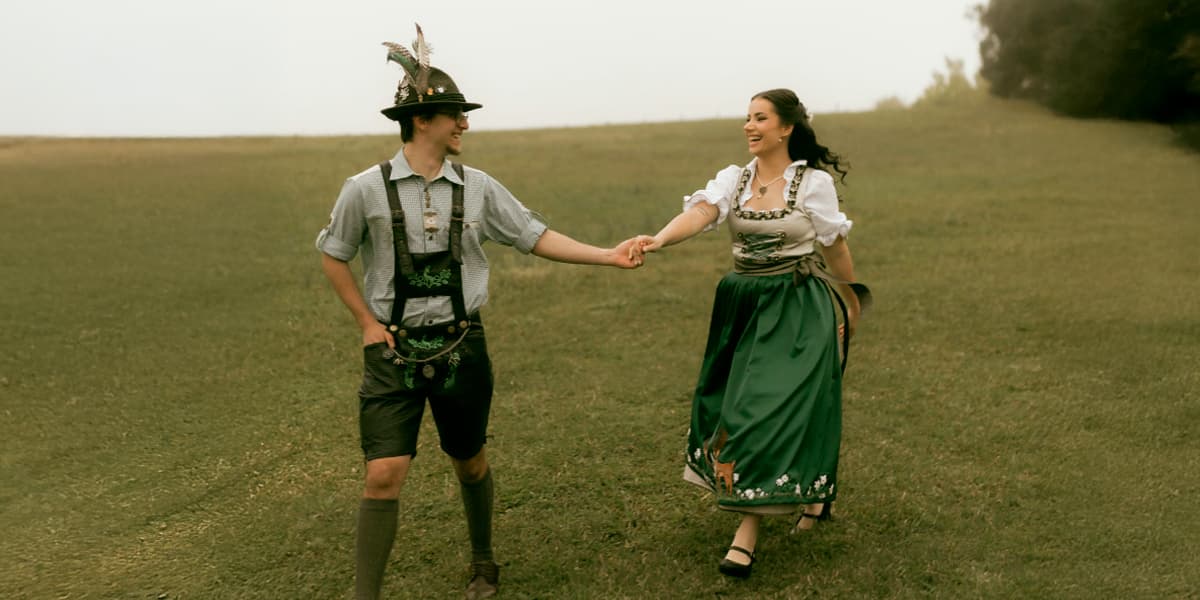
Oktoberfest German Traditions
From the range of Bavarian beer tents to the costume parade, Oktoberfest features several traditions:
O’zapft is! is a Bavarian phrase exclaimed by the Mayor of Munich after tapping the first beer keg in Schottenhamel, the oldest beer tent of the festival. It translates to ‘it’s tapped’, and marks the official opening of Oktoberfest.
The costume parade takes place on the first Sunday of the festival. There’s a 5-mile procession through Munich’s city centre featuring dancers, marching bands and crowds dressed in traditional clothing.
Bavarian beer tents form the heart of the festival, and they’re free to enter. These elaborate temporary structures are the perfect place to enjoy an authentic stein of beer.
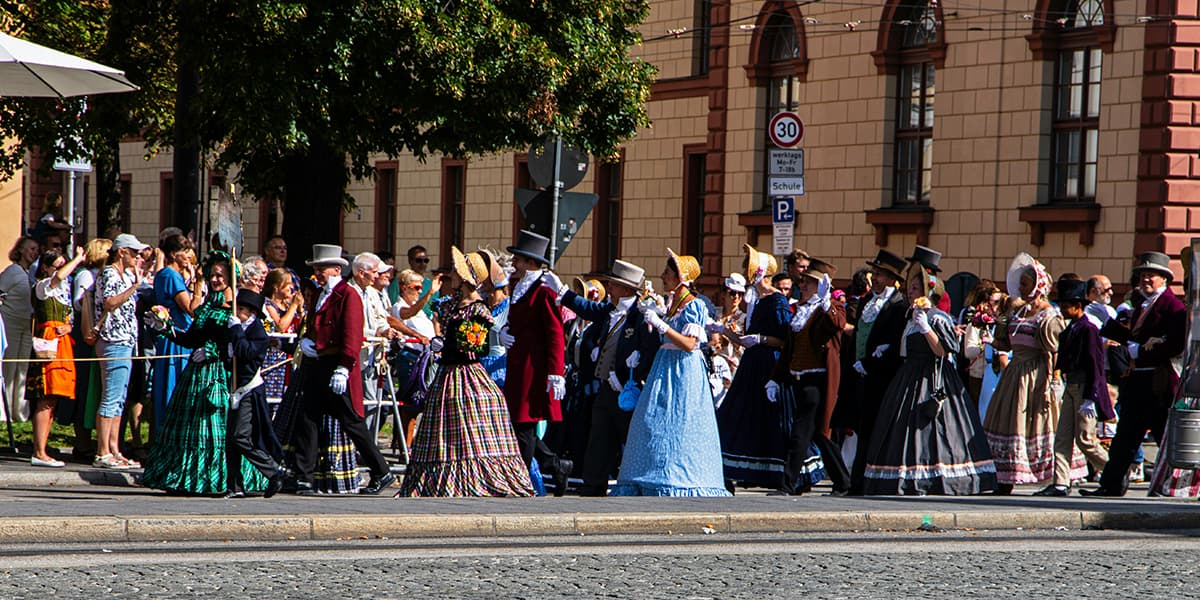
The Best Oktoberfest Tents
With numerous tents offering unique specialities, choosing where to spend your time can be overwhelming. Here are some tents to consider:
Marstall caters to younger, international crowds with a capacity for over 3,400 people, guaranteeing high energy and contemporary touches while maintaining Bavarian traditions.
Schottenhamel holds the distinction as one of Oktoberfest’s oldest tents, remaining popular with locals and tourists for its historical significance.
Paulaner Festzelt stands as one of the largest structures, accommodating over 8,000 people in a vibrant atmosphere.
Augustiner-Festhalle offers the most family-friendly environment, perfect for visitors with children or anyone looking for a relaxed experience without sacrificing authenticity.
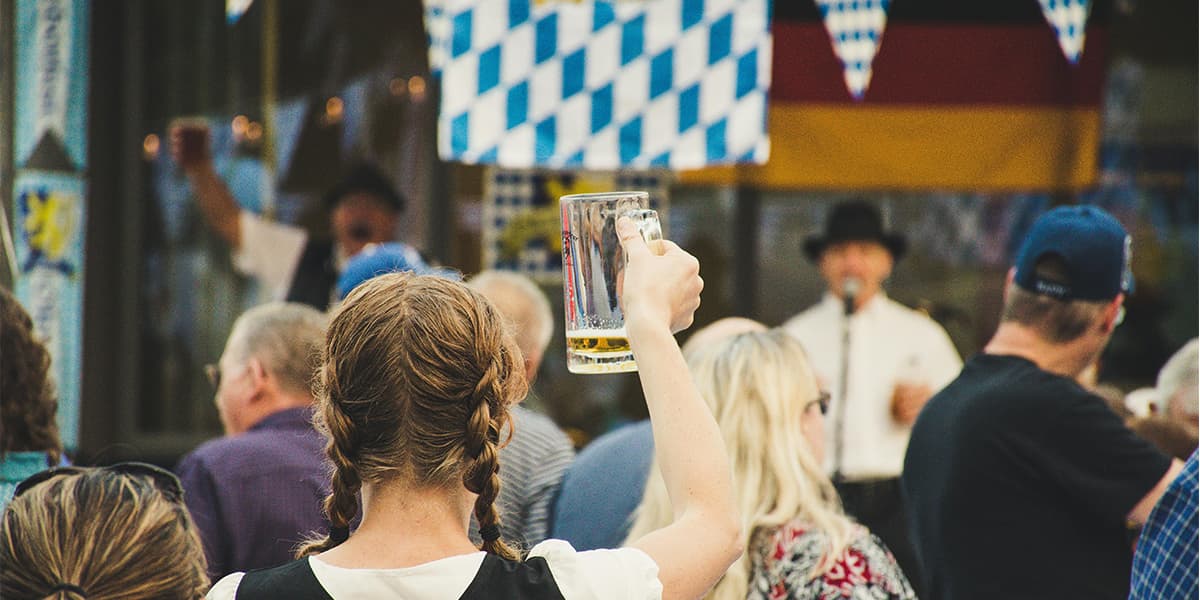
German Cuisine
Before you settle down in a beer tent, don’t forget to sample some authentic Bavarian delicacies, including:
Bratwurst – A classic German sausage, often served with mustard and a side of sauerkraut.
Hendl – A whole or half-roasted chicken, often cooked on a spit.
Brezel – A pretzel with a crispy exterior and soft interior, which can be eaten plain or with obatzda, a Bavarian cheese spread.
Schweinshaxe – Pork knuckle, found at the end of a pig’s leg, is one of the most loved Bavarian foods served at Oktoberfest.
Apfelstrudel – Apple strudel is a famous German dessert served with vanilla sauce or ice cream.
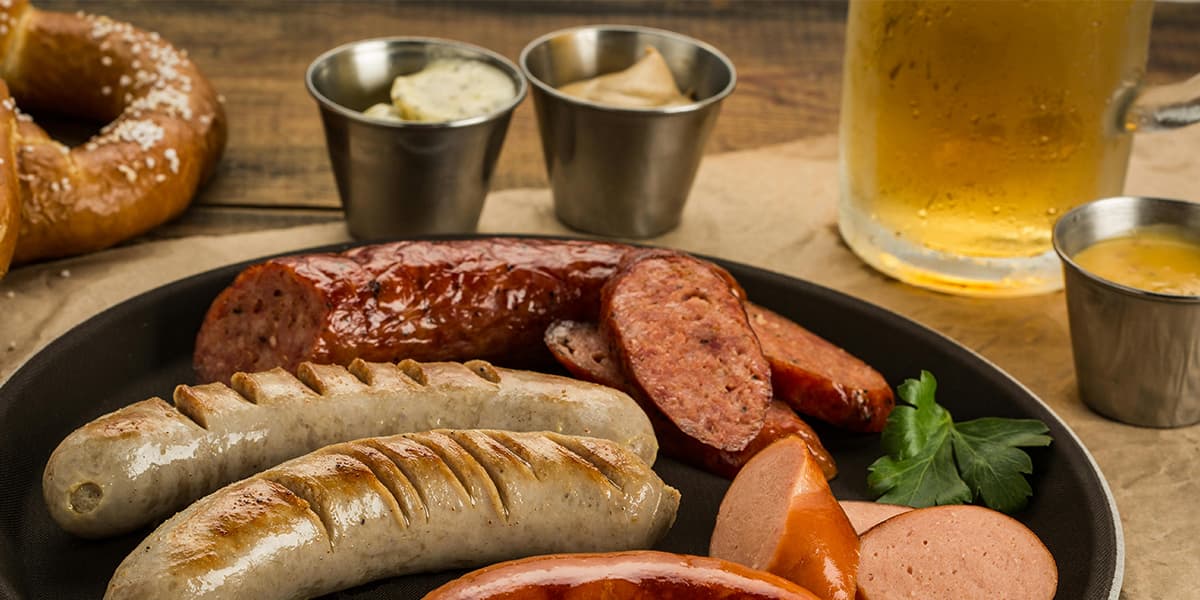
Beer and Oktoberfest Museum
Munich’s Beer and Oktoberfest Museum is a must-visit for festival-goers. Housed in one of Munich’s oldest townhouses, the museum dates back to the 14th century. Head here to learn more about the history of beer in Munich and the brewing process. The museum features several exhibitions about Oktoberfest, including the festival’s evolution from a royal wedding to the world-renowned celebrations we recognise today. There’s plenty of Oktoberfest memorabilia to look at, including pictures, flags and old tankards, as well as videos and interactive features. After exploring the museum, visit the cosy bistro in the building’s lower level to enjoy delicious beer and authentic German dishes prepared using traditional recipes.
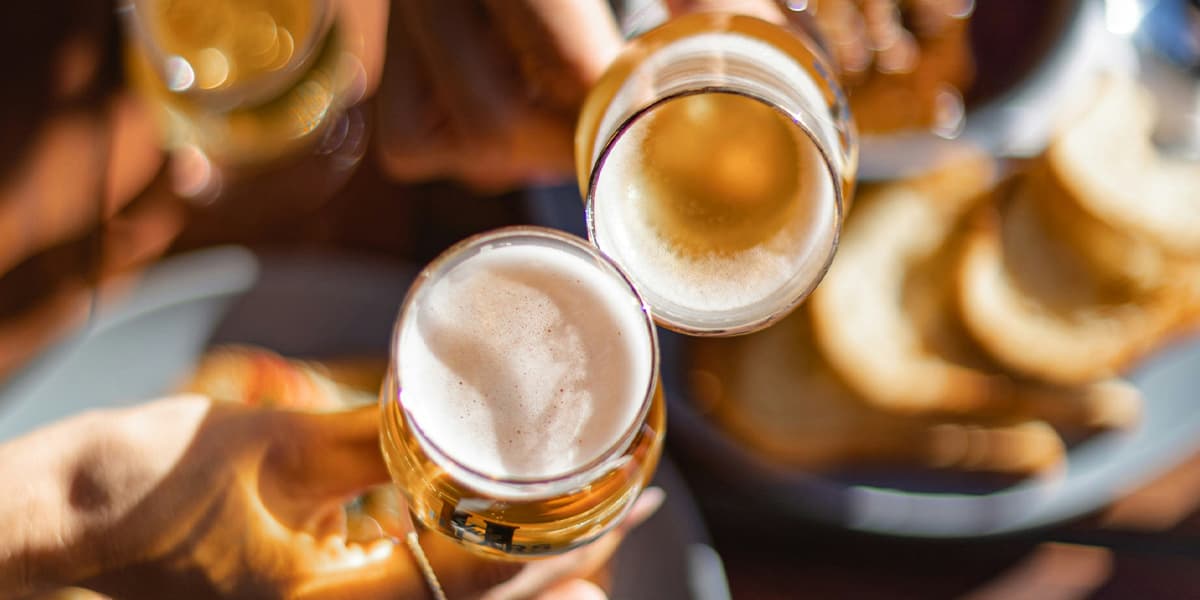
Do’s and Don’ts at the Festival
Do’s
Enjoy the Bavarian food - From delicious bratwursts and hendl to brezel, there are plenty of local delicacies to try.
Explore the fun fair – Most visitors focus on the beer tents, but you shouldn’t forget to explore the fairground stalls and rides.
Take cash – This will be helpful when tipping staff, as the tents will be mostly table service.
Don’ts
Don’t bring large rucksacks or bags – Security prohibits large bags on the festival grounds, so bring a small bag for the essentials.
Don’t chug beer – Some tents have specific rules – you may be kicked out, so be careful!
Don’t bring any pets – Animals are not allowed at the festival at any time, except for assistance dogs.
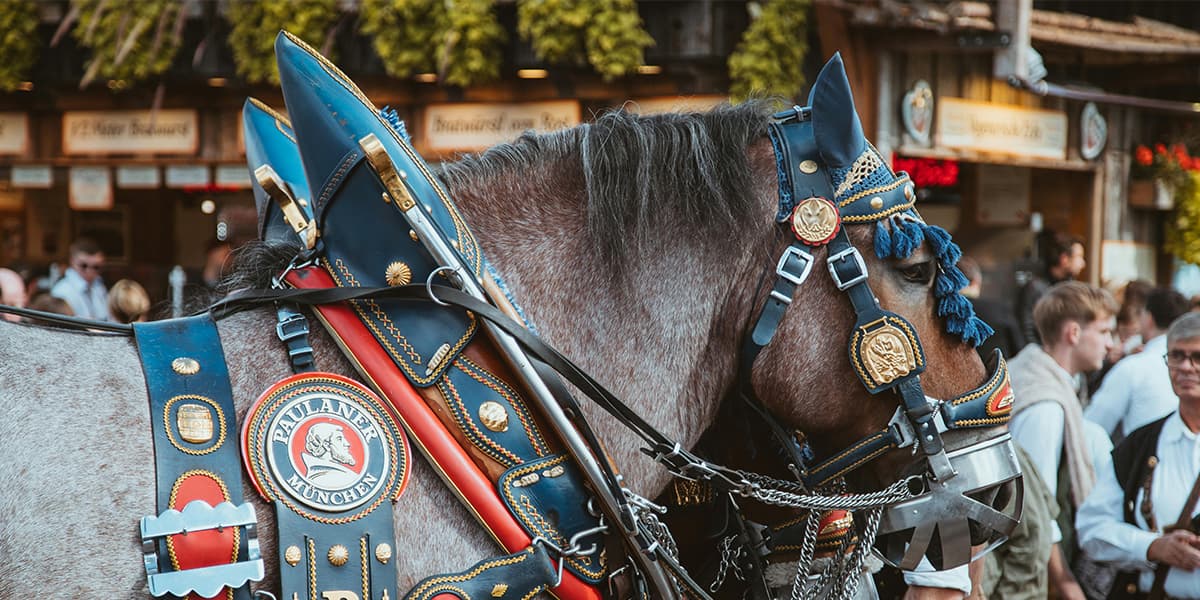
How to Prepare for Your Visit
Planning your trip will make your Oktoberfest experience stress-free and enjoyable. Consider the following:
Book your accommodation in advance – Munich becomes incredibly busy during Oktoberfest, and hotels and hostels fill up months before the event. Secure your accommodation early to avoid disappointment and excessive costs.
Research your trip thoroughly – Plan which tents you’ll visit, eateries to sample, and Munich attractions to explore. Read our guide to the best things to do in Germany or how to spend six days in Germany to make the most of your trip.
Learn basic German phrases – Enhance your cultural experience and show respect for local traditions by learning phrases, like Bitte (please), Danke (thank you) and Porst! (cheers!).
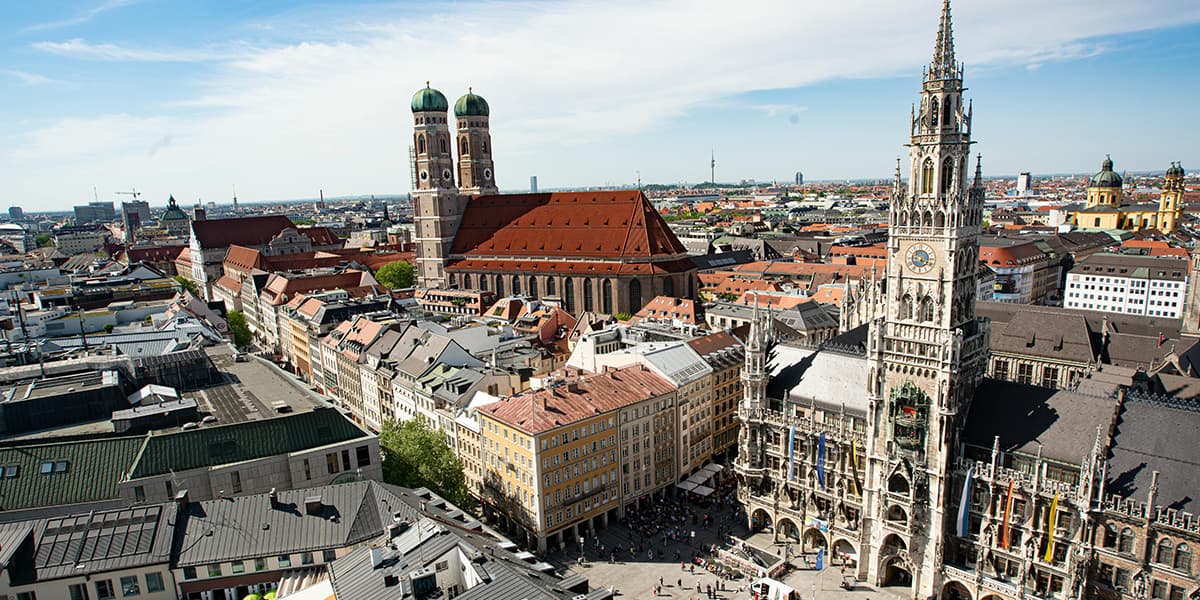
Final Tips
To ensure your Oktoberfest experience runs smoothly, follow these valuable tips:
Visit on weekdays or mornings – The festival grounds and beer tents will have fewer crowds, allowing more relaxed experiences and easier table access.
Arrive early – Tents open at 9am and large queues form beforehand, so plan extra time to secure good seating.
Stick to smaller groups – The fewer people with you, the easier it will be to find a table or be seated in a tent. Consider splitting large parties strategically to improve your chances.
Pace yourself! – Oktoberfest beer is potent, so ensure you stay hydrated and know your limits.
